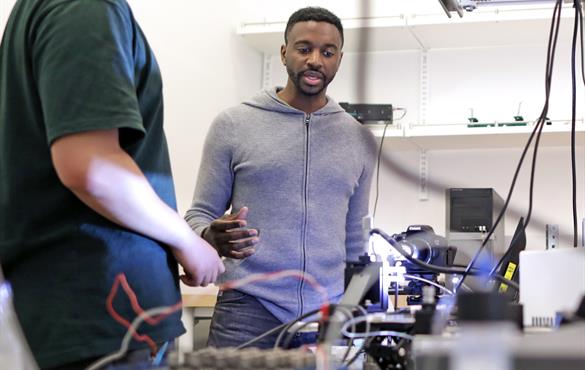Agonafer receives ASME Early Career award
Damena Agonafer received an Early Career Award from the American Society of Mechanical Engineers (ASME) at its InterPACK Conference

Damena Agonafer, assistant professor of mechanical engineering & materials science, received the Electronics and Photonics Packaging Division (EPPD) 2019 Early Career Award from the American Society of Mechanical Engineers (ASME) at its InterPACK Conference Oct. 7-9 in Anaheim, California.
The award recognizes a young engineer with significant technical achievements in his or her career in electronic and photonic packaging demonstrated through papers, patents or product development, as well as his or her contributions to the EPPD field. The recipient must be within 10 years of his or her last degree received.
Agonafer's research is at the intersection of thermal-fluid sciences, interfacial transport phenomena and renewable energy. He develops novel materials and systems for thermal management of power and microelectronic systems, as well as for thermochemical and electrochemical energy storage applications. His goal is to achieve transformational changes in technologies by tuning and controlling solid-liquid-vapor interactions at micro/nano length scales.
"It is great to see Damena receiving well-deserved recognition for the innovative work he is doing," said Philip Bayly, the Lilyan & E. Lisle Hughes Professor of Mechanical Engineering and chair of the Department of Mechanical Engineering & Materials Science. "Managing heat in complex electronic devices is a critical challenge for mechanical engineers now and in the coming decades, and Damena is at the forefront of academic researchers confronting that challenge."
Research in his Nanoscale Energy and Interfacial Transport (NEIT) lab is funded by Cisco Systems and Google Inc. He is developing new thermal materials and structures, including a micro-heat exchanger, that would help to manage the heat load in high-power CPUs in micro-electronics applications such as data centers without compromising performance. In the future, this cooling technology can also be applied to a broad range of other applications, such as power electronics and military applications.
Agonafer is a faculty adviser to the Institute of Materials Science and Engineering, a member of the Center for Solar Energy and Energy Storage, and faculty adviser to the National Society of Black Engineers (NSBE), all at Washington University. He earned a doctorate at the University of Illinois in 2012, a master's from Carnegie Mellon University in 2006 and a bachelor's from the University of Texas at Arlington in 2004. After earning a doctorate, he worked as a postdoctoral researcher in Kenneth Goodson's lab at Stanford University before joining Washington University in St. Louis.



